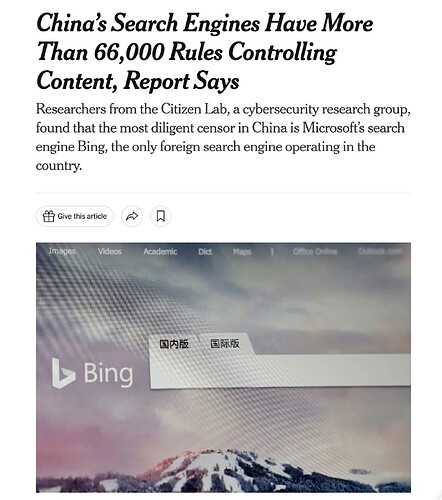-
多伦多大学公民实验室的一份报告发现,在中国,有超过66,000条规则控制着人们使用搜索引擎的内容。微软的必应搜索引擎是最勤奋的审查者,使用算法对被认为是政治敏感的搜索进行 “硬审查”。所研究的科技公司包括搜索引擎百度、搜狗和必应,以及社交媒体网站微博、豆瓣、Bilibili和百度知道,还有电子商务巨头京东。
-
中国的审查机制已经变得更加普遍和微妙。科技公司已经建立了一些机制来遵守政府不断变化的限制,包括审查犯罪活动、淫秽、色情、暴力和血腥,以及几乎所有被视为威胁到共产党统治和社会稳定的政治、民族或宗教内容。最近的限制已经扩展到对国家英雄或烈士的诽谤、非法代孕和有关北京Covid-19的误导或虚假信息。
-
报告发现,与其他科技公司相比,必应的规则范围更广,影响的搜索结果更多,而且平均来说,限制了更多域名的搜索结果。微软是少数仍在中国运营的外国科技公司之一,为了做到这一点,它必须遵守中国的审查法。这项研究加强了这样一个论点,即外国科技公司在限制审查制度或政府的其他要求方面可以做的很少。
-
A report by the Citizen Lab at the University of Toronto has uncovered more than 66,000 rules controlling the content available to people using search engines in China. Microsoft’s Bing search engine is the most diligent censor, using algorithms to “hard censor” searches deemed to be politically sensitive. The tech companies studied included search engines Baidu, Sogou, and Bing, as well as social media sites Weibo, Douyin, Bilibili and Baidu Zhidao, and the e-commerce giant Jingdong.
-
China’s censorship apparatus has become more pervasive and subtle. The tech companies have created mechanisms to comply with the government’s ever-evolving restrictions, including censoring criminal activity, obscenity, pornography, violence and gore, as well as virtually any political, ethnic or religious content viewed as threatening to Communist Party rule and social stability. More recent restrictions have extended to defamation of the country’s heroes or martyrs, illegal surrogacy and misleading or false information about Covid-19 in Beijing.
-
The report found that Bing’s rules were broader and affected more search results than the other tech companies, and on average restricted results from more domains. Microsoft is one of the few foreign technology companies still operating in China, and to do so it has had to comply with the country’s censorship laws. The study reinforces the argument that foreign tech companies can do little to restrict censorship or other demands from the government.
